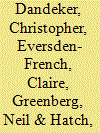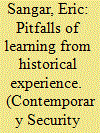| Srl | Item |
| 1 |
ID:
094138


|
|
|
|
|
| Publication |
2010.
|
| Summary/Abstract |
U.K. Reserve Forces, principally the Territorial Army (TA), have been increasingly used since the end of the cold war, but there have been some concerns about their mental health problems and also possible unwillingness to remain in service. This article reports on the retention issues of 191 TA personnel who deployed to Iraq from 2003 to 2006. Qualitative data were thematically analyzed from three complementary studies. The authors found that, in 2003, negative aspects of Army organizational culture were reported as the prime reasons for TA personnel wishing to leave the military. In particular, Reservists reported their being unaccepted and underutilized. In contrast, by 2006, TA personnel were generally reporting being satisfied with their work as a Reservist and felt integrated with Regular colleagues. Those who stated they wanted to leave the military now reported it was primarily because of poor military family welfare support. These results suggest that although the British Army appears to have successfully managed the changing role and integration of the TA on operations, family welfare needs further consideration as an important influence on retention. Since the end of data collection for this study, new measures focusing on welfare have been introduced. Future work will assess the impact of these changes.
|
|
|
|
|
|
|
|
|
|
|
|
|
|
|
|
| 2 |
ID:
146812


|
|
|
|
|
| Contents |
Why do armies often fail to transmit and coherently apply lessons from their past? Using the concept of ‘layered organizational culture’, this article formulates a pioneering theoretical argument to explain how military organizations learn from their historical experience. Analysing empirical material from internal debates within the British Army, the article observes an inherent incompatibility between lessons gleaned from, on the one hand, the Anglo-Afghan Wars and, on the other hand, British counterinsurgency campaigns after 1945. This is less a result of actual differences in the external context but of changing organizational ‘filters’: different layers of military organizational culture result in different ways of selecting and transmitting relevant lessons from warfare experience. Older and newer cultural layers can interact and thus contribute to incoherent strategy-making in the present. This argument is illustrated by reviewing the layering process within the British Army since the 19th century. The article shows a shift from emphasizing the specificity of local contexts towards the application of universal principles. This has contemporary relevance: co-exisiting yet incompatible historical lessons contributed to significant incoherence in operational strategy during the initial months of the British deployment in Afghanistan in 2006.
|
|
|
|
|
|
|
|
|
|
|
|
|
|
|
|